|
Dusty Dog Reviews The whole project is hip, anti-academic, the poetry of reluctant grown-ups, picking noses in church. An enjoyable romp! Though also serious. |
|
Nick DiSpoldo, Small Press Review (on Children, Churches and Daddies, April 1997) Children, Churches and Daddies is eclectic, alive and is as contemporary as tomorrow’s news. |



|
Kenneth DiMaggio (on cc&d, April 2011) CC&D continues to have an edge with intelligence. It seems like a lot of poetry and small press publications are getting more conservative or just playing it too academically safe. Once in awhile I come across a self-advertized journal on the edge, but the problem is that some of the work just tries to shock you for the hell of it, and only ends up embarrassing you the reader. CC&D has a nice balance; [the] publication takes risks, but can thankfully take them without the juvenile attempt to shock. |
|
from Mike Brennan 12/07/11 I think you are one of the leaders in the indie presses right now and congrats on your dark greatness. |
Volume 233, June 2012
(the 19 year anniversary issue)
Internet ISSN 1555-1555, print ISSN 1068-5154
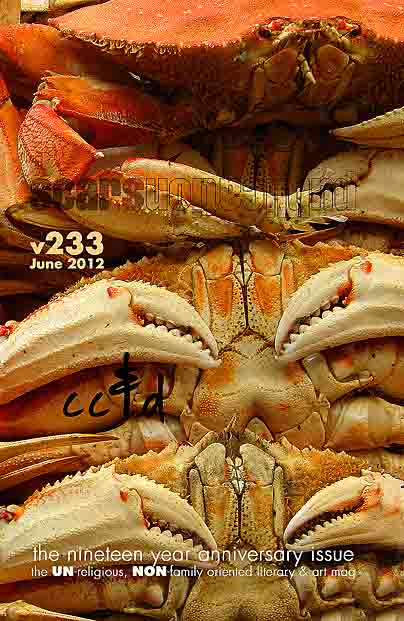
see what’s in this issue...
Note that in the print edition of cc&d magazine, all artwork within the pages of the book appear in black and white.
|
Order this issue from our printer as a a $7.67 paperback book (5.5" x 8.5") perfect-bound w/ b&w pages |
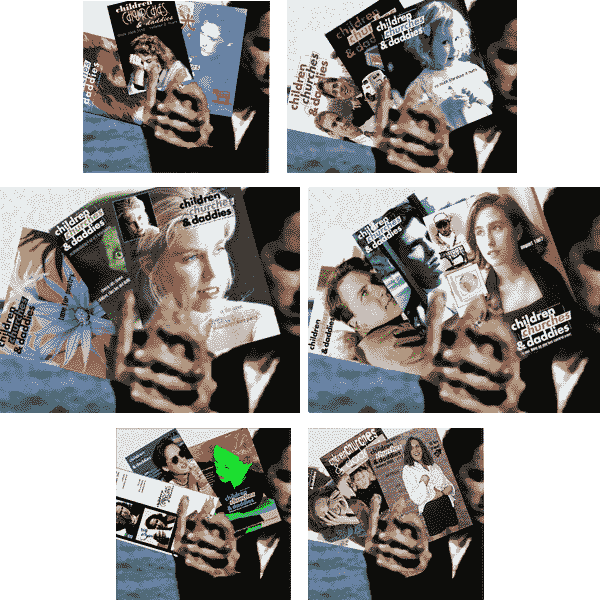

poetry
the passionate stuff
God & The HomosexualJoseph Hart
Attila! Hitler! Stalin! They did not
|
| Bob Rashkow reads the Joseph Hart June 2012 cc&d poem God and the Homosexual |

Watch the YouTube video of the reading of the poem straight from the June 2012 issue, live 6/9/12 at Gallery Cabaret’s the Café Gallery in Chicago) |
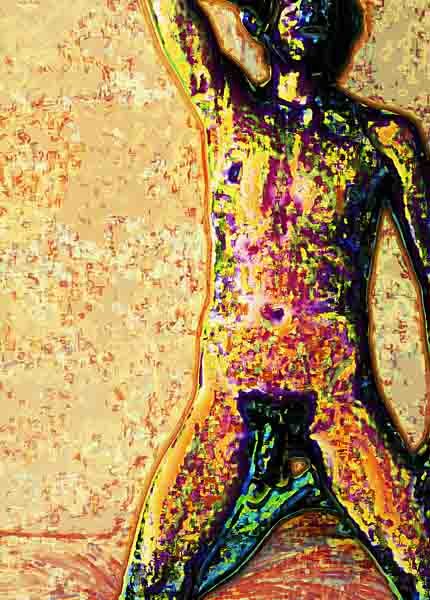
Champion, art by Henry Walter Matthews
On The Way To Denny’sJoseph Hart
Anyway I’m not alone.
|
| Jaime Walton read the Joseph Hart June 2012 cc&d poem On the Way To Danny’s straight from the June 2012 issue, live 6/9/12 at Gallery Cabaret’s the Café Gallery in Chicago |
The Mannequin SpecialBrian Looney
Am I staring at a mannequin, or is it a real face before me?
She can’t accept life’s progress, the natural and orderly deterioration of matter.
It’s there when I take the order, when she presents her face with confidence.
I went to put their order in, but all I had written down was something about mannequins.
|
Brian Looney BioBrian Looney was born 12/2/85 and is from Albuquerque, NM. He likes it when Lady Poetry kicks him in the head. The harder the better. Check out his website at Reclusewritings.com.
|
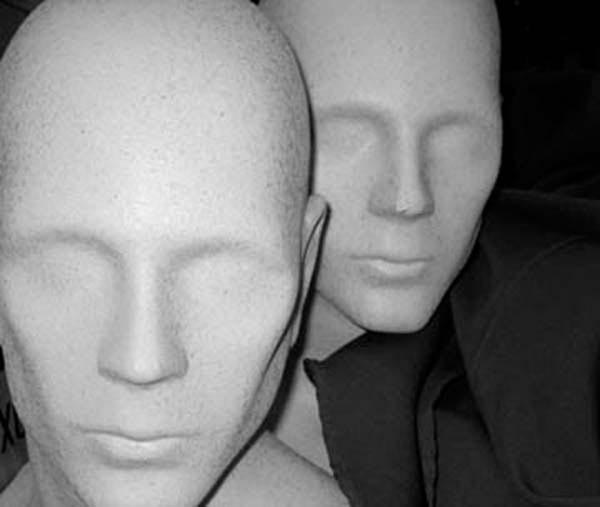
Two Forward, art by Cheryl Townsend
The Poison In The AirDavid Thompson
The few who remained were surprised
Her marriage lasted only 36 hours
|
Numbers 13:
Michael Ceraolo |
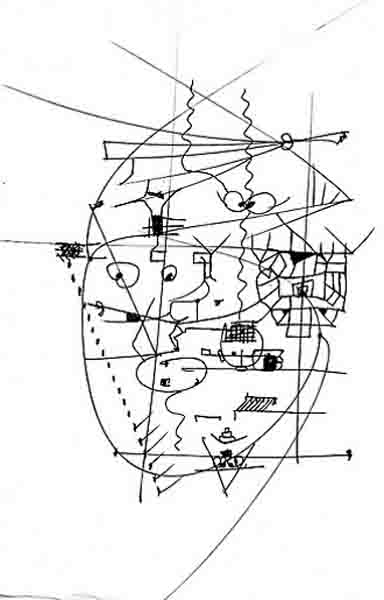
eyes, art by the HA!man of South Africa
Talk to Your FutureW. Dontā Andrews
It seems only right that I should start with you
Then there is you, appropriately placed in the middle,
And then of course there is you, last but not least, not least.
Tall order, is it? Asking for much, am I?
|
W. Dontā Andrews Bio. Dontā Andrews lives and writes in Kalamazoo, Michigan. He studied Business Management at Cornerstone University. He studies life for writing material. He founded and has run a regularly attended writers group for the past 6 years. His work was also published in the anthology “All Poetry is Prayer” (Creative Justice Press). Recently he finished his first book, a collection of stories and poetry concentrated on self awareness, or rather the epidemic of its absence in the world today. It includes the pieces accepted for publication in CC&D Magazine. He is currently working on a novel.
|
Some Babies Just KnowHolly Day
that they’re born on thin ice
|
Holly Day Short BioHolly Day is a housewife and mother of two living in Minneapolis, Minnesota. Her poetry has recently appeared in Hawai’i Pacific Review, The Oxford American, and Slipstream. Her book publications include Music Composition for Dummies, Guitar-All-in-One for Dummies, and Music Theory for Dummies, which has recently been translated into French, Dutch, Spanish, Russian, and Portuguese.
|

Snow, art by Oz Hardwick
Sea DriftFrank DeCanio
Possessions are flotsam in the sea previously published in Yasou Engine
|

Journey, art by Peter LaBerge
(who also has artwork at flickr)
I hope my tongue
John Newmark |

MOTIF UZEYIR TAK3K, art by Üzeyir Lokman ÇAYCI
Keeper of the FlameCopyright R. N. Taber 2012
I pile on wood,
I pile on wood,
I run out of wood,
Fire smouldering, but a flicker
|
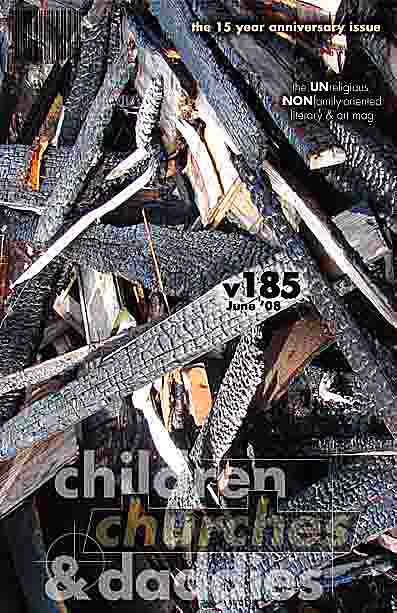
An Informal Admonition
Lily Gardner |
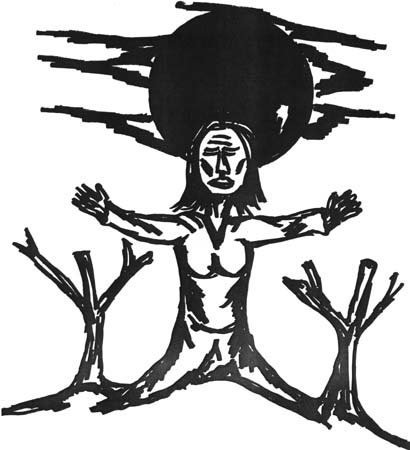
Plea, art by Edward Michael O’Durr Supranowicz
Bring Manufacturing BackI.B. Rad
Despite complicity,
|
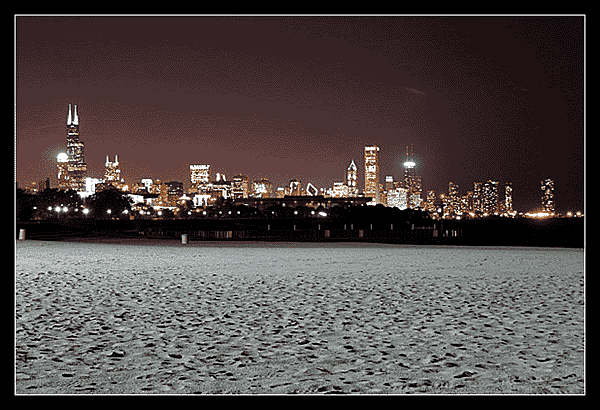
31st Street View, art by Nick Brazinsky
Religion is like CancerS. Progress
Dancing Across my awareness
I was born of woman
|
| Jaime Walton read the S. Progress June 2012 cc&d poem Religion is like Cancer straight from the June 2012 issue, live 6/9/12 at Gallery Cabaret’s the Café Gallery in Chicago) |

Human Construct of TimeJanet Kuypers(10/21/11 #1)
is this the best of times
only humans understand time
if i ever saw god
but time is a human construct
|

Watch this YouTube video read live 11/01/11, at the Café open mike she hosts in Chicago |

See this YouTube video of Kuypers reading this and other new poems & poetry from 11/11 cc&d and Down in the Dirt magazines, the day they were released |

Watch this YouTube video of take 1 (in studio) read 12/31/11, with John Yotko on guitar and sampled wind-up clock ticking |

Watch this YouTube video of take 2 (in studio) read 12/31/11, with John Yotko on guitar and sampled wind-up clock ticking |

Watch this YouTube video of take 3 (in studio) read 12/31/11, with John Yotko on guitar and sampled wind-up clock ticking |

Watch this YouTube video of take 4 (in studio) read 12/31/11, with John Yotko on guitar and sampled wind-up clock ticking |

Watch this YouTube video live at Café Ballou 1/2/12, with John Yotko on guitar and sampled wind-up clock ticking (from the Samsung) |

Watch this YouTube video live at Café Ballou 1/2/12, with John Yotko on guitar and sampled wind-up clock ticking (from the Sony) |
On This RideJanet Kuypers(twitter-length poem writen 10/21/11 #2)
we’re on this ride together
we’ve left for our fairytale honeymoon
|

Watch this YouTube video read live 11/01/11, at the Café open mike she hosts in Chicago |

See this YouTube video of Kuypers reading this and other new poems & poetry from 11/11 cc&d and Down in the Dirt magazines, the day they were released |
No Compunction
Janet Kuypers |




(live images photographed by Chuck Kramer)

Watch this YouTube video listen: |
Janet Kuypers Bio
Janet Kuypers has a Communications degree in News/Editorial Journalism (starting in computer science engineering studies) from the UIUC. She had the equivalent of a minor in photography and specialized in creative writing. A portrait photographer for years in the early 1990s, she was also an acquaintance rape workshop facilitator, and she started her publishing career as an editor of two literary magazines. Later she was an art director, webmaster and photographer for a few magazines for a publishing company in Chicago, and this Journalism major was even the final featured poetry performer of 15 poets with a 10 minute feature at the 2006 Society of Professional Journalism Expo’s Chicago Poetry Showcase. This certified minister was even the officiant of a wedding in 2006. |

prose
the meat and potatoes stuff
Everybody wears a suit & tie exceptFritz Hamilton
Everybody wears a suit & tie except me, the headless kangaroo, & the naked ho who roams about offering herself to the important suits & ties. I am in my usual attire of coveralls, dirty shirt, & smelly socks. I roam through the party with my glass of hemlock, & everybody but the headless kangaroo holds me in disdain, as if I’d sneaked into the wrong party, which, of course, I have. I had intended to go to the state madhouse in time for dinner, but instead I’m in this party for the filthy rich. I expect to see Michelle Bachman, but maybe she’s waiting for the hundred thousand dollars of farm subsidies she says she doesn’t get in her great Republican political farce to get nominated for president, as Rick Perry, the political farce, is hard on her Right Wing heels. I walk through the party, carrying my hemlock cocktail & nodding to the suits & ties who hate me & sit down on a sofa with the headless kangaroo. I tell him I’m Fred Hammy & shake his foot. I ask him how he hopped the party, & he tells me he was shipped in a box from Australia, & they’d soon make kangaroo burgers of him for the suits & ties. We laugh because it’s as funny as everything else.
|

My friend LindaFritz Hamilton
My friend Linda, 50 percent injun from New Mexico, Mexican & Irish, tells her Pasadena shrink about me, & the shrinko thinks I have syphilis of the brain. I just thought I was brain dead. I carry my head through Pasadena hiding behind a smile of contentment, because I don’t want anyone to see how sick I am behind my teeth.
|


art by Brian Hosey and Lauren Braden
Like SoulsDerrick Sherwin
It was a Sunday morning when Arthur and Annie met, Sunday morning in the vast town cemetery holding the thousands of dead souls who had been long forgotten with their deceased date together with a pathetically sad epithet embossed in place of a lost memory or feeble emotion.
|
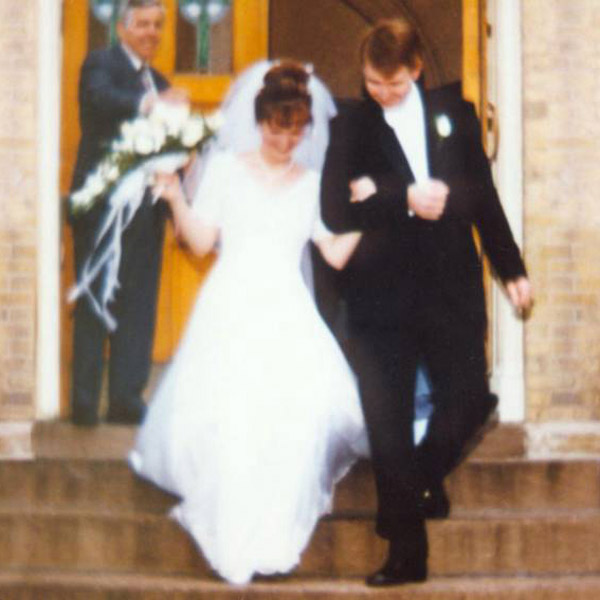


Heavenly RewardsRonald M. Wade
Max and I watched a TV program about suicide bombers and their motivation and we started talking about the heavenly reward for human bombs. The Islamic clerics make sure their followers are dehumanized and turned into poor, ignorant, horribly sex-deprived clowns then promise them seventy-two virgins of their own in paradise after they have completed their one and only mission.
|
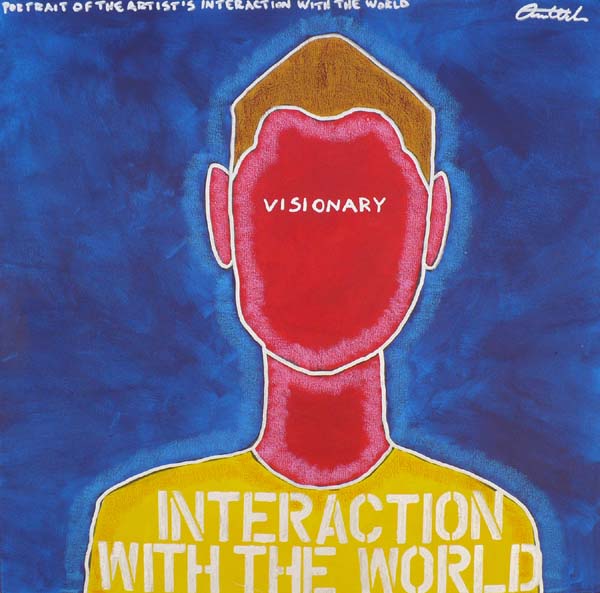
Portrait of the Artist’s Interaction with the World, art by Aaron Wilder
Sidewalk OmeletRobert D. Lyons
After a week’s drinking, I decided to kill myself. I didn’t tell anyone. I figured I would do it while all my girlfriends were in the clubs looking for a new gullible bastard to take for a spin. You see, I’ve always been used because I am a good guy. Women see me and think to themselves I can use this son of a bitch. I can push him around and he is the kind of guy who will do anything if you look him in the eyes. And that’s just what they do. I begin to resent it: being pushed. Just always being pushed around like they have my cock on a string.
|
LiquefiedBrian Duggan
It was Saturday in that final week of February, 1984. Morning breezes swept in from the Pacific pushing waves against Marina del Rey’s protecting breakwater. Sailboats tugged on taut lines while halyards beat aluminum masts in all lettered basins. Boils erupted in mid-channel where seagulls dive-bombed panicked anchovies driven to the surface by voracious schools of Bonita.
Sanger knew the mind had gone topsy-turvy; Justine had made room for yet another companion, this time it was an unseen adult offering advice. “Don’t listen to that psychiatrist; Stephen uses him to manipulate you.” There were no more counseling sessions, prescriptions or secrets shared with Dr. Sanger.
During the year’s first week, a mere seven weeks ago, a handsome, twenty-three year old Irish face with the requisite dark eyes and brown hair had descended on Malone Casting. Probing questions about his theatrical past were dispensed with a quick wit. Michael Morrison had more than a passing interest in being cast for the role of Eugene O’Neill’s alter ego, Edmund Tyrone in Long Day’s Journey Into Night.
In Manhattan a phone was a necessity and Michael had a ready answer for the missing telephone in his apartment. “The thing’s been banjaxed since I dropped it in the tub.” A car in Manhattan was a troublesome luxury so he had taken the subway to the Woodlawn Avenue #4 subway station and then walked to the Bronx’s Monte Fiore Hospital.
She made room. Michael was more than close, two became one. Their interplay held center stage for Trish and lonely singles, as the couple moved from the sobriety of eye contact to the intoxication of memorized features.
“A story teller of the King, whose name is lost to my recall, was on his way to fatherhood and a Druid, named Cathbad—can’t misplace that one—forewarned that the baby girl would be beautiful with the hair and eyes that I see before me.”
She moved past the slowly shaking head, kissed his cheek and snuggled in his arms. “Well...I’m waiting?” His last hit was long and for the first time in weeks brought freedom from painful breathing. Exhaling gently he saw his ocean of purple air topple books. He had no urge to cough and thought he heard a distant voice but purple waves drowned it out.
By Monday morning, the weekend’s grey sky had evaporated. Precisely at 11 A.M. a brilliant sun poked through as expected. Still air hung over the glistening surface of the marina. Behind the protecting breakwater lethargic sailboats with sagging dock lines cast mirror images down all the numbered basins. The sky turned pristine with white clouds floating in a blue sky over the City of Angels.
|
The Check-upJohn Duncklee
George Armbruster glanced away from the front page of the WALL STREET JOURNAL just as Herman, his wife’s Miniature Schnauzer, leaped to Marge’s chair, stole an English muffin from her plate on the breakfast table, and jumped back down to race into the living room to take refuge on the flower-patterned couch facing the large stone fireplace. Marge stopped in her tracks with coffee-pot in hand.
The ample parking lot in front of the veterinary clinic had designated spaces for “Patient Parking”, “Deliveries Only” and “Doctors Only”. In front of a sign painted in gold lettering saying “Doctor Diefendorfor” a new red Farrari Sports coupe sat sparkling in the morning sun. Next to it a BMW and a Mercedes were parked sedately in front of the more inconspicuous “Doctors Only” section. Marge left the clinic, picked up the dry-cleaning, and went to her tennis club for lunch where she spent the afternoon chatting with her best friend, Harriet, mostly about their respective dogs.
Returning to the clinic shortly before four o’clock, Marge asked the girl behind the counter if Herman was ready.
|

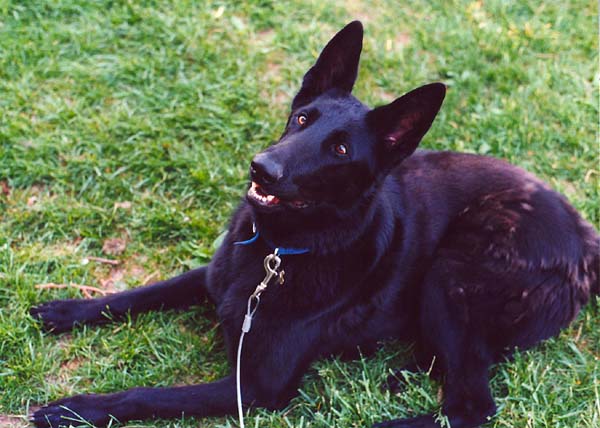


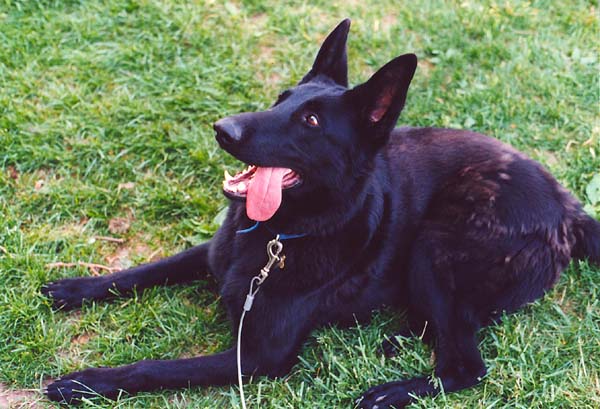
Jehovah JointStephen V. Ramey
Witnesses scoured the land with their droning promises of eternal salve. From a peephole that made the world outside even smaller, Jeremiah Wilson, retired college professor and disciple of the hemp, watched a pair of them stride up the stoned walkway to his porch. He undid the security chain and turned the knob lock. He opened the door.
|
Freedom Christine Barba
I embrace positive quotes; this fact is the last thing you would expect of someone like me. Someone who wakes up each morning to metal bars encircling my cage – bars to conquer the animal within. Someone who fashionably wears the same orange jumpsuit with the skid mark on the left leg each day. Someone whose current idea of fun is the half hour of fresh air allowed to me when I’m welcomed by black pavement and another large cage hugging the pavement. A girl who never expected to find herself here.
We continued to kiss and he began undoing the zipper to my dress, slowly letting it drop so that my bra showed. I had refused at first for I was scared but I was drunk and with a little prodding he achieved his goal. He began kissing my bra, then my boobs, and slowly began undoing the hook to my bra. I was reluctant and afraid but something inside of me told me this was the most fun I would have in a long time, the most fun I ever had, and to let this go would be silly. He took his own shirt off, and then his shorts so that he was only in his boxers. By this point I was very nervous and wanted to tell him that this was going too far. But as he continued kissing me, something told me I would never receive this much affection again. Sad, at the time, but true. He began to pull my dress down entirely so I would only be left in my underwear. “No,” I whispered. He continued trying. “Please, Josh, no not yet,” I remember pleading. But he continued anyway, and I was afraid he’d leave if I complained so I let him. When he began touching me there, it was like nothing I had ever felt before. I wanted to kiss him one thousand times, do anything for him, if he could make me feel like this. As he began taking off his boxers I was horrified. “Josh, no this is too far,” I told him. “But why?” he whispered. “I’ve never seen someone as beautiful as you; now I know that you’re beautiful inside and out,” he continued. I let him take off his pants. This is as far as we will go, I told myself as he rubbed up against me. Pressing me down with his body weight, he held me down and tried taking off my underwear. “No,” I said clearly. “But you’re so beautiful,” he said. “Josh, no this is too far, I’m done,” I said. “But what if I’m not done with you?” he said. As I struggled underneath him he took off my underwear. I began to cry. “Please, Josh, no, I don’t want to do this,” I begged. Looking frustrated he stared at me. “Okay, how about I pour us another drink? He asked. “I have some of the stuff in my closet over there and we can just finish off the night lying here and cuddling with our last drinks.” He smiled at me. “How’s that sound?” Finally, he was being the sweet Josh I knew again. Lying in his bed and cuddling with him sounded like heaven. After I finished my forth drink everything felt fuzzy. I don’t remember much except silently sobbing, trying to push Josh off of me but being so weak I was unable to do so. My arms felt heavy, as did my entire body. Had I been drugged? And I remember him inside of me, and me being able to do nothing about it. The next day, I woke up entirely disoriented. I was lying on my friend Lisa’s bed, next to a snoring Lisa, in a pair of pajamas. Shifting slightly, I must have woken Lisa up. “Thank God, my mother was asleep when Tiffany got us home. If she saw you in the state you were in, she would have killed me! And luckily, she works Saturdays and left before we woke up because I’m sure you are completely hung over.” Everything was still fuzzy, my head was killing me and I had forgotten last night’s events. “Thank goodness Josh was nice enough to have brought you back downstairs. He told us he found you basically slumped over in the corner of his room smiling, too intoxicated to even recognize him.” Then I remembered, Josh. He had raped me. He had deliberately lied to my friends and most likely drugged me to the point I was too lethargic to consent or not consent to anything. Tears welled up in my eyes. “It’s okay,” Lisa continued. “I’m just glad you finally had fun, though I’m sure you’ll be feeling the effects today, and evil Roy might murder you before I can ever see you again. But I won’t let you.” I felt sick but the last place I could go was home. When I finally did return home, my heart felt sick, my stomach had an enormous lump and my legs shook. When I walked in the door Roy slapped me across the face. I knew he hadn’t called the police; he’d be too afraid of what I would tell them. Instead he stormed, “I don’t care where you were. For the next five days you will be attached to this leash I bought.” I looked in horror at a dog leash he held in his hands. “If you disobey, I will tell horrible lies about you, maybe even kill you. You will be tied to this in your room every until it’s time to do your chores, which will be quadrupled for nearly eternity.” I threw up on his carpet and he slapped me again. For the next month, I began feeling sick every morning and it wasn’t because of the lack of food Roy gave me. He had always done this. My friends at school began avoiding me because I refused to look Josh in the eye and he told them he realized I was attractive, but a real weirdo. His friends backed him up. After not getting my period for nearly two months I began to panic and felt even sicker. I didn’t care if Roy would kill me for this but before returning home I stopped at a drugstore and bought something I never imagined I would possess, a pregnancy test. Slipping into the drugstore bathroom, I stared at the directions on the stick. I felt so sick I wanted to puke again. Squatting down I peed on that dreaded thing and leaving it on the sink waited for a result. Someone began knocking on the door and I yelled, “Just a second!” I waited a good fifteen minutes, terrified to look at it. And when I did, I nearly puked again. I was pregnant. I hid my secret for another three months. It wasn’t hard when your provider nearly congratulated you for wearing baggy clothes. Abortion wasn’t an option; the only money I received was Roy’s, I had no cell phone, and the places were too far to walk to. Thus, I had no money for a cab. One night when Roy didn’t realize I had simply a flimsy white night shirt on, and my large stomach peaked through, he walked into my room. Looking at me, then pausing and staring down at my stomach, his eyes widened in rage, as I’m sure my own widened in fear, and he slapped me so hard I saw stars. “GET OUT!” he bellowed. “Get out of my house now before I call the police and tell them you’ve been stealing from me!” I began to cry. “But Roy, I have no money and this wasn’t my fault.” He simply screamed, “Get out now you little whore. You slut! You disgust me!” “And don’t expect to go back to school,” he continued. “I’m telling them we moved.” I walked out of that house with only the clothes on my back and the child inside of me. For one week I survived by starving and stealing. But eventually, when I was caught stealing food from a drugstore, someone noticed and called the cops. I was dirty, pregnant and pitiful looking, and the sad truth of law is, I didn’t have a chance. When I tried telling the cop about Roy and my story, the first time I had ever spoken out he looked at me as if I was the world’s biggest liar. But, still they had to investigate and Roy would be testifying. Roy convinced the jury I was a thief; he said after my mom died I stole from him and lied to him and was an all around bad egg and liar. When I brought up Josh they informed me this wasn’t a rape case, this was theft. It was true, I had gotten greedy and stolen $175 worth of stuff; it had seemed so easy. But I was trying to save my own and my baby’s life. Regardless of whether I was pregnant, I would be sent to jail for a year, and within that time sent to a hospital to have my baby; Roy decided she would be given up for adoption. And so here I am. And now you know my story. My beautiful baby girl, I hope that someday you will be able to read this story when mommy is free and can have you back again, when fate is finally kind to me. When I am allowed to be free from the wrath of a terrible stepfather, of a boy my own age who deceived me, of the law that denied me justice, of this cage. Someday I hope that to you, I will be the lovely mother that I once lost, and my story will teach you to never let anyone deny you of free will, of freedom. To always speak your mind when someone has done you wrong. And that I will touch your life, with my story, that someday my story will make a difference. But most importantly I want you to learn that everyone is put here for a purpose and that no one should ever feel that they don’t belong here. I have finally realized that my purpose is to give you the freedom, and more importantly the love, that I never had. The full version of this story was found nearly five years later in a crevice in the wall of Julie’s cell. The other copy of the story was multiplied by five thousand and is now on the New York Times Best Seller List. Roy was put behind bars when he found Julie’s house, and attempted to attack her little girl. Josh is being charged with rape, not for raping Julie, but another woman he met at a club. And Julie? She lives in a beautiful white house with her daughter Freda. Their favorite past time is playing in the enormous backyard that surrounds their house and that does NOT contain a fence.
|
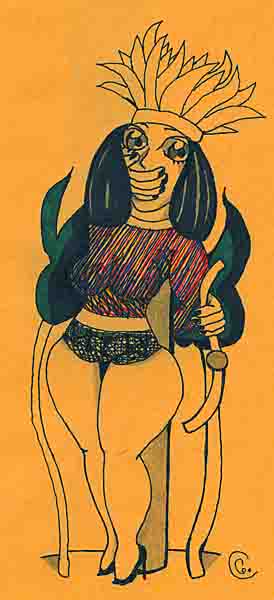
art by George Coston
Drum BeatsYasmin Ramirez
I darted between cars in the rainbow stained parking lot, leaping over small inky puddles from the gathering mist. I hurried, only to stand in line. I was late. I was always late, even when I tried to be on time. My phone vibrated and I looked down as it lit up with a text that said, “Inside where u @?” I sent a quick response and waited. I sighed and leaned against the wall to keep out of the spray, resigned to wait another fifteen minutes till I could get in. There was always something about live shows that I loved. The air tingled a little and people stood around anxious, waiting, hoping, that they were going to have a good time. The slight deaf feeling after and the rush of adrenaline always made them worth it. Tonight, Sage had convinced me to come out even though I didn’t know the people playing.
“Oh my god that took forever. I’m so sorry!” I yelled, gesturing to the bartender, “Heineken, please.”
I pulled at the strap on my heel and rested my feet on the bottom of the chair near me. I saw the next band go up with only a second glance. Sage poked me in the arm and gave a thumbs up sign. I smiled and nodded. They began to play, but I continued to people watch, taking in appearances and sometimes bemusedly laughing, when something caught my attention. I heard it, it started out faint and it grew, but I felt it in my chest. I looked up at the band. I saw the top of the drummers head as he slouched over the drums. The beat did something, what I wasn’t sure, but I felt as if he was playing something familiar, intimate, something only I knew. How did he know my beat? I wanted to see his face to see how this stranger with two wooden sticks in his hands had found this moment, in this song. As it ended he finally raised his head and I saw the same face I had seen earlier, the slender guy with the little boys’ laugh. This time, the smile was real and didn’t immediately disappear. It lit up his face and he laughed as he nodded to the lead singer and they went straight into another song.
|
The Eve of St. AgnesWm. Samuel BradfordA man wearing a backpack walks down the red light district in Amsterdam. He walks up to the windows with prostitutes dancing behind them. He knocks on the door next to one window and a prostitute wearing white answers. They talk for a little while and the man enters and they walk together into a small back room. There is a bed and a sink in the room. A mirror runs horizontally on the opposite wall from the bed. AGNES: Money first. MAN: How much? AGNES: Fifty is the minimum. If you want extra it will be a hundred and fifty. MAN: Extra? AGNES: Touching and positions. PauseMAN: Ok, let’s go for that. He gives her money from wallet, which she puts in a small pocketbook by the bed. Pause.AGNES: My name is Pamela. MAN: Sure. AGNES: Do you want me to strip? MAN: No. He appears irritated. Just, um, just sit here for a moment first. They sit on the bed. He looks at her, waits a moment, and starts rummaging through his backpack. He pulls out a yellowed and tattered paperback, and opens it to a marked page. He hands her the book.Here. Read this. AGNES: Ok. From where? MAN: From here. He points. She Reads “Domination in Black” by Wallace Stevens, she trips over some pronunciations. He has his eyes closed the entire time, listening intently. The first time she misses a word, she asks him. He says the right word.It’s ok. Don’t worry about the words. Just keep going. She finishes. Pause. She reaches over to him suggestively.AGNES: Now what if I just— MAN: irritated No. Stop. We’ll find another one to read. Pause. What do you think about love? AGNES: What? MAN: frustrated Never mind. Forget I said that. He nervously flips through the pages. He gets up from the bed, walks around. He looks through the mirror and back at AGNES.MAN: Is this a double-sided mirror? AGNES: What? MAN: Can people see us? AGNES: nervous No. We are alone. MAN: Sure. He returns to the bed. AGNES: I’m sorry. This just seems a little strange. MAN: What? You don’t like Wallace Stevens? AGNES: flustered No. I mean, you paid. Shouldn’t we – MAN: No. We shouldn’t. Not yet. Please, start again. He hands her the book and closes his eyes. She takes the book and re-reads the first line.Stop. There it is. That’s why I was doing it. You see, that was the moment. You are a woman. I know you are there. I close my eyes, and I hear the poetry, spoken by a woman. The words are beautiful. The woman is beautiful. But when I close my eyes, whose beauty is it? Yours or the poem’s? It blends. Pause.AGNES: slightly angry What do you want? MAN: calm What do I want? AGNES: Yes. Am I going to be reading poetry all night? This is ridiculous. What is it that you want? MAN: I want to write. AGNES: she lets her accent slip Just what the world needs, another writer. Look pal, if you want to write about girls like me, Dostoevsky was about two hundred years ahead – MAN: lost in thought No, you are mistaken. I want to write stories, just to have them read by a woman, not for the story itself. All literature has just been for the story itself, or worse, the ideas. I want merely to have my stories read by a woman... in a red dress. Yes, I write for red dresses. I want that same beautiful woman to let me paint her. I want her to be in the same room as I, and I want to watch her open a wire cage and pull out the brightest red and green parrot on her finger. I want to have this parrot in my stories too. Nights will be long and tireless. [breaking into verse] We will say when the song shall end,/ long enough for the paint to dry,/ the paint of flesh and feather,/ and my black ink, racing in wild, close-eyed fervor to dry/ and we will laugh, the woman, parrot and I. AGNES: What are you talking about? MAN: We’ll laugh because we will know the indistinguishability between the paint and the ink, the ink and the flesh, and the flesh and the laugh. He pauses. That is not your real accent, is it, how you were speaking earlier? AGNES: No. MAN: And you read Dostoevsky? AGNES: Yes. MAN: pensively Oh. AGNES: Look, whatever. What you are saying doesn’t make any sense. You are starting to freak me out, honestly. MAN: no longer cheery And why is that Pamela? Because I’m not following the protocol? Because I came in here, not refusing to acknowledge the truth – that we do not know each other, and you want nothing to do with my body. You are freaking out because a stranger does not want to insert his genitals into yours and for one brief moment give himself the mental satisfaction that he is succeeding in the ritual of sex, or, perhaps if he is really honest, tricking himself into thinking he has love, or does not need it, partaking in a basic lesson in friction in a circumstance where it is at least economically acceptable by way of monetary transaction? This is freaking you out, Pamela? That for one moment when you are presenting yourself to me as a good or a service (I can’t really figure out which one) I insist on viewing you as a woman rather than an object? You’re mad because I don’t want you to be an object, Pamela? Is that it? AGNES: Look man, I just – MAN: And here I am just trying to have a conversation with someone, trying to maintain some level of honesty, trying to find a moment of humanity amongst people wearing blinders, masks, a world of facades where I merely want to embrace some inkling of sincerity. AGNES: You’re crazy. MAN: Yes, but at least I have been talking crazy talk in my real accent. Pause AGNES: Look, I’m sorry. You’re not crazy. I’m just not... used to that kind of stuff. So we’re not going to – MAN shakes his head. PauseAGNES: Sorry, I just wanted to make sure. Pause. So, what were you saying about the paintings? MAN: The paintings? AGNES: Yeah, ink and paint and parrots or something. MAN: Oh, right, the fundamental problem. It’s easier to see by looking at the painting of a woman. When you are painting, there are correct lines and incorrect lines. When an incorrect line is made, it is painted over again and again until the correct line is found, which remains visible. So what is a finished painting really? One to be seen as all correct lines, or one not to be seen as incorrect lines that are erased and covered up? Both types exist in the painting, but what is it really—what we see or what we don’t? The incorrect lines, the erased lines, they have as much to do with the painting as the correct ones. Well then you can look at color. The parrot is red, the woman’s dress is red, but is the parrot dress-colored or is the dress parrot-colored? It’s easy to not see the difference ultimately between the paint of the flesh and the paint of the feathers, to see it all as paint. But what about the paint and the ink of my stories – both mediums of art, of the woman, read by the woman, they are understood as of the woman. And what about her laugh? Let’s say she laughs while I am painting her, a laugh that comes from one of my stories which she reads – the scenario can be understood in terms of that too. Where does it stop? AGNES: What does that matter if it is a red parrot or a red dress? MAN: It matters a lot. It’s perspective. It’s the most important thing. Look, we can’t actually say anything about anything, all we can say is our own subjective perspective, and if it all works, if everything can be looked at in terms of everything else, where do we stop? It’s the difference, which may not be as big as we think, between loving a woman and loving the painting of her. It all comes back to the fundamental problem with love. AGNES: And what’s that? MAN: That if we really want to love infinitely, we should love every atom of the universe the same. Look, what I’m saying is that it’s wonderful that there is an infinite amount, or rather, anti-amount of guiding factors when it comes to perception. The difference is that there ultimately is no difference. Red Parrot, red dress. Just like your red dress. AGNES: My dress is white. MAN: It looks red to me. AGNES: It’s the light. MAN: hmm. Does red light on a white dress make the dress red? I guess it is both red and white. He closes his eyes. And now it’s black. AGNES: Are you on drugs, man? MAN: What? I don’t think you’re getting it. You want me to put this in terms of math for you? AGNES: Sure. MAN: Ok so they say it is impossible to draw a triangle without drawing three straight lines; like, you can’t draw it by using only one straight line. AGNES: Yeah MAN: But let’s say you just take a line and let it go on to infinity. You know, that happens all the time, people talking about lines going on forever and ever. AGNES: Ok MAN: Yeah, but people don’t understand what that means, what it really means to go on forever and ever. I mean, if you’re going to have something continuing to infinity, eventually after so much space, you are going to moving outside of space. Meters, miles, light-years, they can’t be measured in terms of numbers anymore because eventually there will be no more numbers left. If we are really talking about things in terms of infinity, you are going to reach a point where you start counting in letters, or pieces of fruit, or emotions, and eventually, far enough down the road, to maintain integrity in the idea of infinity, the only way for that straight line to continue will be for it to make itself into a triangle, and on and on it will go, past numbers, past things, past ideas even. AGNES: So everything is infinite? MAN: Everything...as infinite as you want it to be at least. AGNES: Ok, make my hand infinite. MAN: Alright, hold it out in front of you and look at it. She does.I’m going to bring you in before I take you out. So, what do you see? Four fingers, your thumb, and your palm. The lines that run across and tickle when they are touched. On the surface there is the oil that your body generates which may be slightly acidic, and according to the Bronsted-Lowry definition of an acid, you’ve got some extra hydrogen ions that would like to go somewhere else, that want to stray, mix with someone else’s oil perhaps. Beneath the oil you’ve got your epidermis, and your dermis, made up of skin cells, fat, and then you’ve got muscle, various veins and vessels, and bone. There are millions of germs on your hand, living, dying, fighting, eating each other, having sex. Your hand is already a drama. All these things are made of atoms, and each atom has subatomic particles, protons, neutrons, electrons. And each of these is made of quarks, crazy things jumping and flying around at rates and in paths that no one can really determine. You have trillions upon trillions of them in your hand, more in your hand then there are stars in the entire universe, and these quarks may even be made of something, string-like objects, elastic bands that make no sense whatsoever because they break just about every physical law there is to break, being in two places at once, splitting apart, coming together, acting in a manner that would seem to suggest parallel dimensions would have to exist. Not to mention the fact that your hand is experiencing the force of gravity, which, as an object of matter contributes as well, even if it is only a little bit, in the impression the earth makes in the fabric of space-time; it helps in generating the very gravity that holds it down; your hand is not only your hand, it’s the forces on your hand. It gets better. We haven’t even broken out of science yet. I mean, if you really want to look at your hand, you want to see the infinite nature of it, would that not involve both looking at the hand and not looking at the hand? Concentrate on what you see, so that you can get an idea of what you don’t. Consider this: somewhere, on this planet, in a place where you do not speak the language, an entire field is covered with dew. Across the world perhaps, where the sun has not yet risen, there is a narwhal that has never been seen by a human. It is swimming right now, while you are looking at your hand. It breaks through the surface of the water, penetrating it first with its long tusk, and gives a scream of freedom as it fills its lungs with the icy air. Now, the thing is, in terms of perspective, would the narwhal still exist if you had not looked at your hand? Look, we’re all made of energy. Everything fundamentally is energy; even solid things are just stored energy: the sun, you, me, narwhals, and paint. It’s all the same. But we’re still not there. So many things about this hand have yet to be considered. We are still looking at your hand in terms of things that exist, but what about things that don’t exist? Think of how your dreams relate to this hand. All kinds of nonsense, unicorns, magic kingdoms, your second grade teacher giving remedial alchemy lessons to a banana, lobsters doing yoga. If you are thinking about it, and looking at your hand, some kind of a connection is established, it exists, just outside the realm of rationality, which is only half the picture. You’ve got to embrace the infinity that’s there and the infinity that isn’t. Absurdity is only a recognition of infinity. AGNES: Wow. That’s fairly incredible. Pause. I must say, this is a type of penetration I haven’t experienced. She laughs uneasily.Sorry, that was inappropriate. Pause. What’s your name? MAN: I’m not going to tell you my name. Why would I need to do that? AGNES: Look, Pamela is not my real name. I want to tell you my real one. He laughs to himself. Pause.AGNES: What’s so funny? MAN: What? Oh, nothing really. It’s just – isn’t it supposed to be such that you don’t want me to know your name, and shouldn’t you not care about mine? AGNES: Yeah, but we seem over that. Pause. So, the fundamental problem of love, huh? MAN: Yeah. AGNES: That there is some kind of relation between everything, that if infinity exists we should love everything the same. MAN: irritated and a little tired Yes, yes. AGNES: And that’s the way to freedom. MAN: What? AGNES: True freedom, no masks. A universe of rapture in every glance; it does exist. The grand problem is then how to love it all. MAN: Look, you’re right, this is a little silly, I should probably get going. I’m sorry for wasting your – AGNES: No, please, stay. I understand now. The woman, the painting of the woman, the bird on her finger, and the screeching peacock from the poem I read a while ago, the screeching peacock and the narwhal’s scream of freedom, which is our freedom. It’s all the same. It’s just energy. MAN: You look a little pale. AGNES: Don’t go. Please....please, I want you to stay. Tell me about yourself. MAN: I’m not going to do that. There’s no need to. I’m a stranger, you’re a stranger. It’s just another label. This whole thing, this evening, it doesn’t mean anything. This is it, this is freedom: I’m whomever you want me to be. He attempts to exit.AGNES: Well then why did you come here? You came to me, remember? To ask a prostitute how to love. MAN: Who else was I going to ask? AGNES: My name is Agnes. I’m nineteen. I was born in Denmark and I used to study dance. I just – it seems stupid... I just want you to know that, regardless of what you tell me. MAN: Goodbye. AGNES: Stop, will you! You’re crazy, you really are, brilliant perhaps, but that doesn’t mean you can talk to me like that and just leave, like, like an asshole! Pause. She is exasperated, Look, I’m sorry. I shouldn’t have said that. You just – you really got to me, like you’re the first person to see me in a long time. And now, you want to leave, like every other client. This is crazy, but you’ve said a lot of crazy stuff, let me say something. MAN: Ok. AGNES: Do you...like me? MAN: No. AGNES: I’m sorry, I just— MAN: Yes. AGNES: What? MAN: No. AGNES: What are you doing? MAN: Yes. AGNES: You’re not making any sense. MAN: No. AGNES: Stop that. Just answer the— MAN: Yes. AGNES: Do you like me? MAN: No. AGNES: Do you like me? MAN: Yes. AGNES: Yes or no? MAN: No. AGNES: Yes or no?! MAN: Yes. AGNES: I don’t understand you. What are you trying to do? Are you trying to tell me something? MAN: No. AGNES: she grabs him by the shoulders. Should I love you? MAN: Yes. AGNES: Really? MAN: No. AGNES: Ugh! Damn you! She stops, thinks, and kisses him.MAN: There. Now we’ve broken free. Not that we’ve broken through one system and created our own, we’ve abandoned systems altogether. That moment of frustration set you free from depending on only yes or no. Infinity is both yes and no at the same time. Love me, love me now, Agnes. Love me so much that you don’t love me. AGNES: I...I’m a prostitute, and you haven’t even told me your name. I don’t believe in love at first sight. MAN: Agnes. Please, love at first sight is for idiots. This is love before first sight. When I love the paintings, art, even and especially the things that don’t make sense, the even sound of footsteps, the way the grass bends and I don’t have reason for it, I see the blending. In loving these things, as far as I’m concerned, we were never not loving each other. Pause.Would you like to know my name? AGNES: Maybe later. I want to read another poem. |
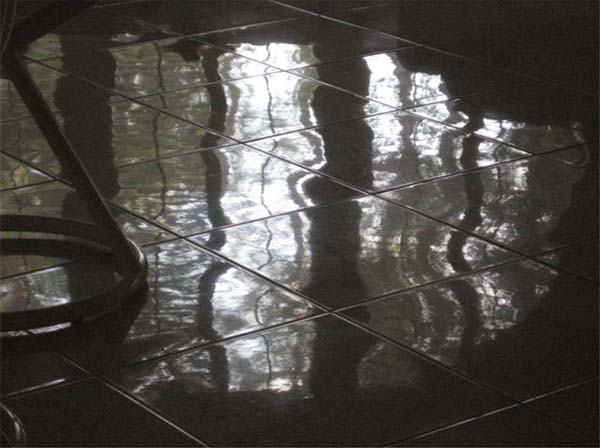
Light on Floor, art by Rose E. Grier
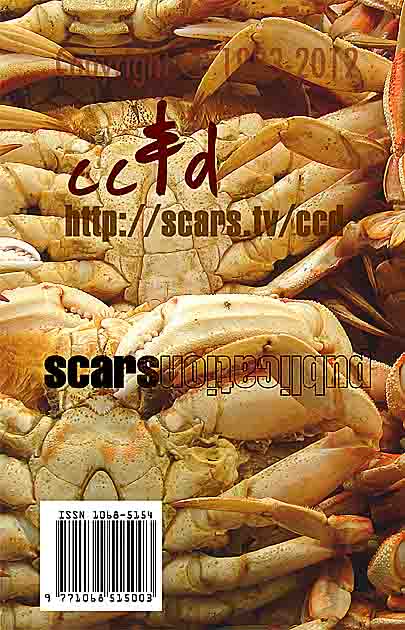

Debra Purdy Kong, writer, British Columbia, Canada I like the magazine a lot. I like the spacious lay-out and the different coloured pages and the variety of writer’s styles. Too many literary magazines read as if everyone graduated from the same course. We need to collect more voices like these and send them everywhere.
Children, Churches and Daddies. It speaks for itself. Write to Scars Publications to submit poetry, prose and artwork to Children, Churches and Daddies literary magazine, or to inquire about having your own chapbook, and maybe a few reviews like these.
what is veganism? A vegan (VEE-gun) is someone who does not consume any animal products. While vegetarians avoid flesh foods, vegans don’t consume dairy or egg products, as well as animal products in clothing and other sources. why veganism? This cruelty-free lifestyle provides many benefits, to animals, the environment and to ourselves. The meat and dairy industry abuses billions of animals. Animal agriculture takes an enormous toll on the land. Consumtion of animal products has been linked to heart disease, colon and breast cancer, osteoporosis, diabetes and a host of other conditions. so what is vegan action?
We can succeed in shifting agriculture away from factory farming, saving millions, or even billions of chickens, cows, pigs, sheep turkeys and other animals from cruelty. A vegan, cruelty-free lifestyle may be the most important step a person can take towards creatin a more just and compassionate society. Contact us for membership information, t-shirt sales or donations.
vegan action
Children, Churches and Daddies no longer distributes free contributor’s copies of issues. In order to receive issues of Children, Churches and Daddies, contact Janet Kuypers at the cc&d e-mail addres. Free electronic subscriptions are available via email. All you need to do is email ccandd@scars.tv... and ask to be added to the free cc+d electronic subscription mailing list. And you can still see issues every month at the Children, Churches and Daddies website, located at http://scars.tv
MIT Vegetarian Support Group (VSG)
functions: We also have a discussion group for all issues related to vegetarianism, which currently has about 150 members, many of whom are outside the Boston area. The group is focusing more toward outreach and evolving from what it has been in years past. We welcome new members, as well as the opportunity to inform people about the benefits of vegetarianism, to our health, the environment, animal welfare, and a variety of other issues.
Dusty Dog Reviews: These poems document a very complicated internal response to the feminine side of social existence. And as the book proceeds the poems become increasingly psychologically complex and, ultimately, fascinating and genuinely rewarding.
Dusty Dog Reviews: She opens with a poem of her own devising, which has that wintry atmosphere demonstrated in the movie version of Boris Pasternak’s Doctor Zhivago. The atmosphere of wintry white and cold, gloriously murderous cold, stark raging cold, numbing and brutalizing cold, appears almost as a character who announces to his audience, “Wisdom occurs only after a laboriously magnificent disappointment.” Alas, that our Dusty Dog for mat cannot do justice to Ms. Kuypers’ very personal layering of her poem across the page.
Fithian Press, Santa Barbara, CA Indeed, there’s a healthy balance here between wit and dark vision, romance and reality, just as there’s a good balance between words and graphics. The work shows brave self-exploration, and serves as a reminder of mortality and the fragile beauty of friendship.
Mark Blickley, writer You Have to be Published to be Appreciated. Do you want to be heard? Contact Children, Churches and Daddies about book or chapbook publishing. These reviews can be yours. Scars Publications, attention J. Kuypers. We’re only an e-mail away. Write to us.
The Center for Renewable Energy and Sustainable Technology The Solar Energy Research & Education Foundation (SEREF), a non-profit organization based in Washington, D.C., established on Earth Day 1993 the Center for Renewable Energy and Sustainable Technology (CREST) as its central project. CREST’s three principal projects are to provide: * on-site training and education workshops on the sustainable development interconnections of energy, economics and environment; * on-line distance learning/training resources on CREST’s SOLSTICE computer, available from 144 countries through email and the Internet; * on-disc training and educational resources through the use of interactive multimedia applications on CD-ROM computer discs - showcasing current achievements and future opportunities in sustainable energy development. The CREST staff also does “on the road” presentations, demonstrations, and workshops showcasing its activities and available resources. For More Information Please Contact: Deborah Anderson dja@crest.org or (202) 289-0061
Dorrance Publishing Co., Pittsburgh, PA want a review like this? contact scars about getting your own book published.
 The magazine Children Churches and Daddies is Copyright © 1993 through 2012 Scars Publications and Design. The rights of the individual pieces remain with the authors. No material may be reprinted without express permission from the author. 
Okay, nilla wafer. Listen up and listen good. How to save your life. Submit, or I’ll have to kill you.
Dorrance Publishing Co., Pittsburgh, PA: “Hope Chest in the Attic” captures the complexity of human nature and reveals startling yet profound discernments about the travesties that surge through the course of life. This collection of poetry, prose and artwork reflects sensitivity toward feminist issues concerning abuse, sexism and equality. It also probes the emotional torrent that people may experience as a reaction to the delicate topics of death, love and family. “Chain Smoking” depicts the emotional distress that afflicted a friend while he struggled to clarify his sexual ambiguity. Not only does this thought-provoking profile address the plight that homosexuals face in a homophobic society, it also characterizes the essence of friendship. “The room of the rape” is a passionate representation of the suffering rape victims experience. Vivid descriptions, rich symbolism, and candid expressions paint a shocking portrait of victory over the gripping fear that consumes the soul after a painful exploitation.
Dusty Dog Reviews (on Without You): She open with a poem of her own devising, which has that wintry atmosphere demonstrated in the movie version of Boris Pasternak’s Doctor Zhivago. The atmosphere of wintry white and cold, gloriously murderous cold, stark raging cold, numbing and brutalizing cold, appears almost as a character who announces to his audience, “Wisdom occurs only after a laboriously magnificent disappointment.” Alas, that our Dusty Dog for mat cannot do justice to Ms. Kuypers’ very personal layering of her poem across the page.
|

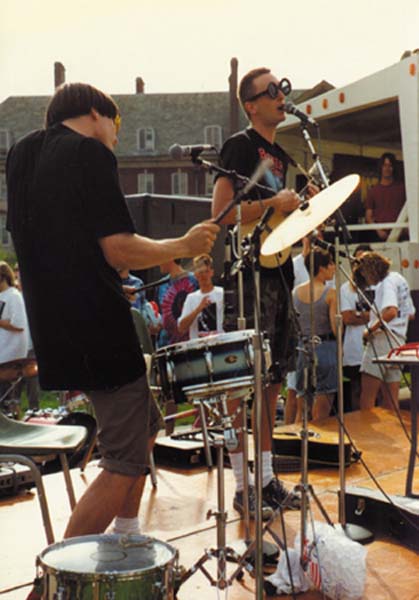 I was lost in these thoughts as I witnessed everyone making their own music, when I saw a tall, slender guy, with closely cropped hair walk out of the door I was eagerly awaiting to get in. He bounced slightly when he walked; heels seeming to barely touch the ground. He emanated a nervous energy, a little faster, more animated then the rest of us, who now mirrored the beats from inside. As he talked to the door guy, he gestured broadly with his hands patted him on his meaty arm with one hand while he pointed inside and laughed. The laughter moved his whole body. His shoulders scrunching up toward his neck, in a childlike motion, back moving in unison to the laughter I couldn’t hear, and when he did this I couldn’t help but resent his exit while I was still waiting to getting in. I watched as he walked past me, grin quickly fading, shoulders suddenly braced, head up as if daring the misty night air. I cocked my head for a moment as I stared after him then turned to see the line had not moved.
I was lost in these thoughts as I witnessed everyone making their own music, when I saw a tall, slender guy, with closely cropped hair walk out of the door I was eagerly awaiting to get in. He bounced slightly when he walked; heels seeming to barely touch the ground. He emanated a nervous energy, a little faster, more animated then the rest of us, who now mirrored the beats from inside. As he talked to the door guy, he gestured broadly with his hands patted him on his meaty arm with one hand while he pointed inside and laughed. The laughter moved his whole body. His shoulders scrunching up toward his neck, in a childlike motion, back moving in unison to the laughter I couldn’t hear, and when he did this I couldn’t help but resent his exit while I was still waiting to getting in. I watched as he walked past me, grin quickly fading, shoulders suddenly braced, head up as if daring the misty night air. I cocked my head for a moment as I stared after him then turned to see the line had not moved.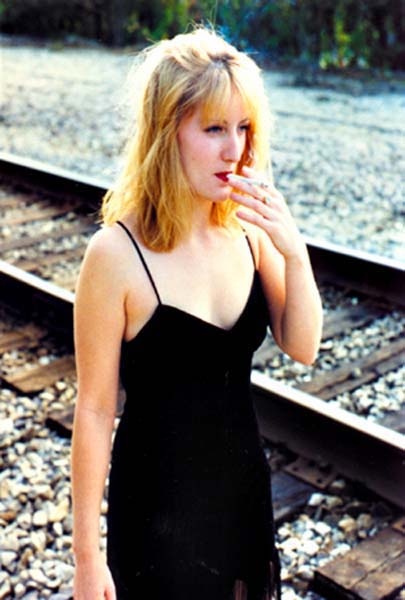 Sage poked me again, this time the thumbs up was a question. I nodded, distracted as I turned back to the stage, and she smiled her bright smile. I was transfixed. There was something about how they played, he played, that made me lean a little further, stand, and forget about the people in front of me. It was wonderful and freeing mingled together. The lead singer eccentric, not wearing shoes just black socks, had Converse kicked to the side. He sang into the mic from a profile angle never directly looking into the crowd. Similar to the way the drummer played head down sinuously swaying side to side. His arms reached out to create the beat that was encompassing me, everyone it seemed as they all swayed and moved. The beats slowly seducing us all into whatever it was he was feeling at the moment. A trace of it could be seen on his face from the brief glimpses he allowed when he looked up. Glimpses where I think he lost himself in what he was doing.
Sage poked me again, this time the thumbs up was a question. I nodded, distracted as I turned back to the stage, and she smiled her bright smile. I was transfixed. There was something about how they played, he played, that made me lean a little further, stand, and forget about the people in front of me. It was wonderful and freeing mingled together. The lead singer eccentric, not wearing shoes just black socks, had Converse kicked to the side. He sang into the mic from a profile angle never directly looking into the crowd. Similar to the way the drummer played head down sinuously swaying side to side. His arms reached out to create the beat that was encompassing me, everyone it seemed as they all swayed and moved. The beats slowly seducing us all into whatever it was he was feeling at the moment. A trace of it could be seen on his face from the brief glimpses he allowed when he looked up. Glimpses where I think he lost himself in what he was doing.